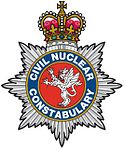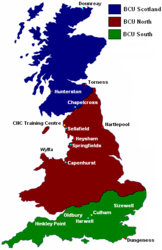- Civil Nuclear Constabulary
-
Civil Nuclear Constabulary Abbreviation CNC Logo of the Civil Nuclear Constabulary. Agency overview Formed 2005 Annual budget £57m (entire Civil Nuclear Police Authority)[1] Legal personality Governmental: Government agency Jurisdictional structure National agency
(Operations jurisdiction)United Kingdom Map of CNC Divisions Legal jurisdiction UK civil nuclear sites General nature Specialist jurisdiction Operational structure Headquarters Culham Sworn members 750[2] Agency executive Richard Thompson, Chief Constable Divisions 3 Facilities Stations 16 Website www.cnc.police.uk The Civil Nuclear Constabulary (CNC) (Welsh: Heddlu Sifil Niwclear) is a special police force responsible for providing law enforcement and security at civil nuclear installations, and for nuclear materials in transit, throughout the United Kingdom.[3]
The CNC was established on 1 April 2005,[4] replacing the former Atomic Energy Authority Constabulary established in 1955. The CNC does not guard the United Kingdom's nuclear weapons; this role is the responsibility of the British Armed Forces and the Ministry of Defence Police.
Contents
Role
The role of the CNC is to provide security for civil nuclear establishments and materials, throughout the United Kingdom.[5] The Constabulary is established in Chapter 3, sections 51–71, of the Energy Act 2004.[6] The act sets up the Civil Nuclear Police Authority and the position of Chief Constable, defines the powers of members of the constabulary, mandates that Her Majesty's Inspectorate of Constabulary must inspect the force and amends several other acts. It falls under the remit of the Department of Energy and Climate Change instead of the Home Office.
Since 3 April 2007 the Chief Constable of the CNC has been Richard Thompson.
Unlike the majority of the British police territorial forces, some CNC officers are routinely armed while carrying out duties. CNC officers also operate the armament on board the ships of the company Pacific Nuclear Transport Limited,[7] which specialise in transporting spent nuclear fuel and reprocessed uranium on behalf of the British Nuclear Fuels organisation.[8] Such ships have an onboard escort of armed police.[9][10]
The uniform of the force is similar to that of forces in Scotland. This replaced the traditional Metropolitan Police style uniforms in July 2008.
Legal jurisdiction
CNC police officers have the same powers as regular police officers, whilst within their limited jurisdiction which is set out in the Energy Act 2004. The act sets out the legal jurisdiction of the CNC police officers as being:
- Civil nuclear sites
- Land around such sites up to 5 km from the boundary
- Shipyards when safeguarding such nuclear materials
- Any place when escorting nuclear materials in transit
- Any place when pursuing or detaining subjects who have unlawfully removed or interfered with materials guarded by the CNC, or have been reasonably suspected of being guilty of doing so
Mutual Aid
The CNC is one of the three special police forces of the United Kingdom, the others being the British Transport Police and Ministry of Defence Police. Unlike these latter two forces the CNC were not included in the provisions setting out 'extended jurisdiction' as per the Anti-terrorism, Crime and Security Act 2001.[11] This allows officers of the MDP and BTP to act outside their natural jurisdiction in certain circumstances.
The CNC is also not included in mutual aid provisions provided by the Police Act 1996 sections 24[12] & 98[13] (mutual aid between police forces of England & Wales, Scotland, Northern Ireland and BTP) or Ministry of Defence Police Act 1987 section 3a [14] (mutual aid from MDP). However section section 59 [15] of the Energy Act 2004 allows CNC officers to act outside their natural jurisdiction in mutual aid situations under agreements between the Chief Officer of the CNC and the Chief Officer of a local police force.
In the summer of 2005 officers of the CNC were part of the massive police operation involving nearly all police forces of the United Kingdom in connection with the G8 conference near Gleneagles, Scotland.[16]
On 2 June 2010 CNC officers assisted Cumbria Constabulary in the manhunt for the gunman Derrick Bird. Along his route across West Cumbria, Bird killed 12 people and injured 25.[17]
Locations
The CNC operates at a total of 16 sites in the United Kingdom. Of these, six are classed as Operational Units, where an ordinary police presence is maintained, while nine are Support Units, which have an overt armed police presence.
- CNC Headquarters - Culham
- Operational Units
- Capenhurst
- Chapelcross
- Dounreay
- Harwell
- Sellafield
- Springfields
- Support Units
- Dungeness
- Hartlepool
- Heysham
- Hinkley Point
- Hunterston
- Oldbury
- Sizewell
- Torness
- Wylfa
In 2007, the CNC adopted a structure similar to other police forces when it introduced three Basic Command Units, each headed by a Superintendent, based around the geographical locations it polices:
- BCU Scotland - responsible for nuclear sites in Scotland
- BCU North - responsible for nuclear sites in the north of England and Wales
- BCU South - responsible for nuclear sites in the south of England
See also
- List of police forces in the United Kingdom
- Policing in the United Kingdom
- Nuclear power in the United Kingdom
External links
References
- ^ http://www.cnc.police.uk/files/strategic_policing_plan_2009-12.pdf
- ^ "What's the Role of the Civil Nuclear Constabulary - Where Do They Work?". Civil Nuclear Constabulary. 2009-03-25. http://www.cnc.police.uk/about-the-cnc/what-do-the-cnc-do/whats-the-role-of-the-civil-nuclear-constabulary-where-do-they-work. Retrieved 2009-06-08.
- ^ "Structure". Civil Nuclear Constabulary. 2009-03-20. http://www.cnc.police.uk/about-the-cnc/who-are-the-cnc/structure. Retrieved 2009-06-08.
- ^ "What's the Background to the CNC Organisation?". Civil Nuclear Constabulary. http://www.cnc.police.uk/about-the-cnc/who-are-the-cnc/whats-the-background-to-the-cnc-organisation. Retrieved 2009-06-08.
- ^ "Our Role". Civil Nuclear Constabulary. 2009-03-20. http://www.cnc.police.uk/about-the-cnc/what-do-the-cnc-do/our-role. Retrieved 2009-06-08.
- ^ "Energy Act 2004". HMSO. http://www.legislation.gov.uk/ukpga/2004/20/part/1/chapter/3. Retrieved 4 April 2011.
- ^ "PNTL Fleet". Pacific Nuclear Transport Limited. http://www.pntl.co.uk/pntl-fleet/. Retrieved 4 April 2011.
- ^ "Nuclear fuel ship docks in Japan". BBC News. 27 September 1999. http://news.bbc.co.uk/1/hi/world/asia-pacific/458551.stm. Retrieved 2008-08-27.
- ^ Brown, Paul (20 January 1999). "Nuclear fuel ships to be armed with heavy guns". London: The Guardian. http://www.guardian.co.uk/uk/1999/jan/20/paulbrown. Retrieved 2008-08-27.
- ^ "UK British nuclear fuel ships armed". BBC News. 8 July 1999. http://news.bbc.co.uk/1/hi/uk/389545.stm. Retrieved 2008-08-27.
- ^ http://www.opsi.gov.uk/acts/acts2001/ukpga_20010024_en_10#pt10-pb3
- ^ http://www.opsi.gov.uk/acts/acts1996/ukpga_19960016_en_2#pt1-pb3-l1g24
- ^ http://www.opsi.gov.uk/acts/acts1996/ukpga_19960016_en_6#pt5-pb3-l1g98
- ^ http://www.opsi.gov.uk/RevisedStatutes/Acts/ukpga/1987/cukpga_19870004_en_1
- ^ http://www.opsi.gov.uk/acts/acts2004/ukpga_20040020_en_6#pt1-ch3-pb4-l1g59
- ^ http://www.elannetworks.co.uk/ge2005.htm
- ^ Bowcott, Owen; Syal, Rajeev; Lewis, Paul; Davies, Caroline (4 June 2010). "Cumbria shootings: A frantic pursuit before police found the killer's body". The Guardian (London). http://www.guardian.co.uk/uk/2010/jun/04/cumbria-shootings-police-response-bird.
 Police forces of the United Kingdom
Police forces of the United KingdomEngland - Avon and Somerset
- Bedfordshire
- Cambridgeshire
- Cheshire
- City of London
- Cleveland
- Cumbria
- Derbyshire
- Devon and Cornwall
- Dorset
- Durham
- Essex
- Gloucestershire
- Greater Manchester
- Hampshire
- Hertfordshire
- Humberside
- Kent
- Lancashire
- Leicestershire
- Lincolnshire
- Merseyside
- Metropolitan
- Norfolk
- North Yorkshire
- Northamptonshire
- Northumbria
- Nottinghamshire
- South Yorkshire
- Staffordshire
- Suffolk
- Surrey
- Sussex
- Thames Valley
- Warwickshire
- West Mercia
- West Midlands
- West Yorkshire
- Wiltshire
Wales Scotland Northern Ireland Special police forces - British Transport
- Civil Nuclear
- Ministry of Defence
Regional units - Central Counties Air Operations Unit
- Central Motorway Police Group
- Chiltern Air Support Unit
- East Midlands Air Support Unit
- North East Air Support Unit
- North Midlands Helicopter Support Unit
- North West Motorway Police Group
- South and East Wales Air Support Unit
- South East Air Support Unit
- Western Counties Air Operations Unit
National units  Category
Category Commons
Commons
Categories:- 2005 establishments in the United Kingdom
- Department of Energy and Climate Change
- Nuclear energy in the United Kingdom
- National police forces of the United Kingdom
- Organizations established in 2005
Wikimedia Foundation. 2010.


